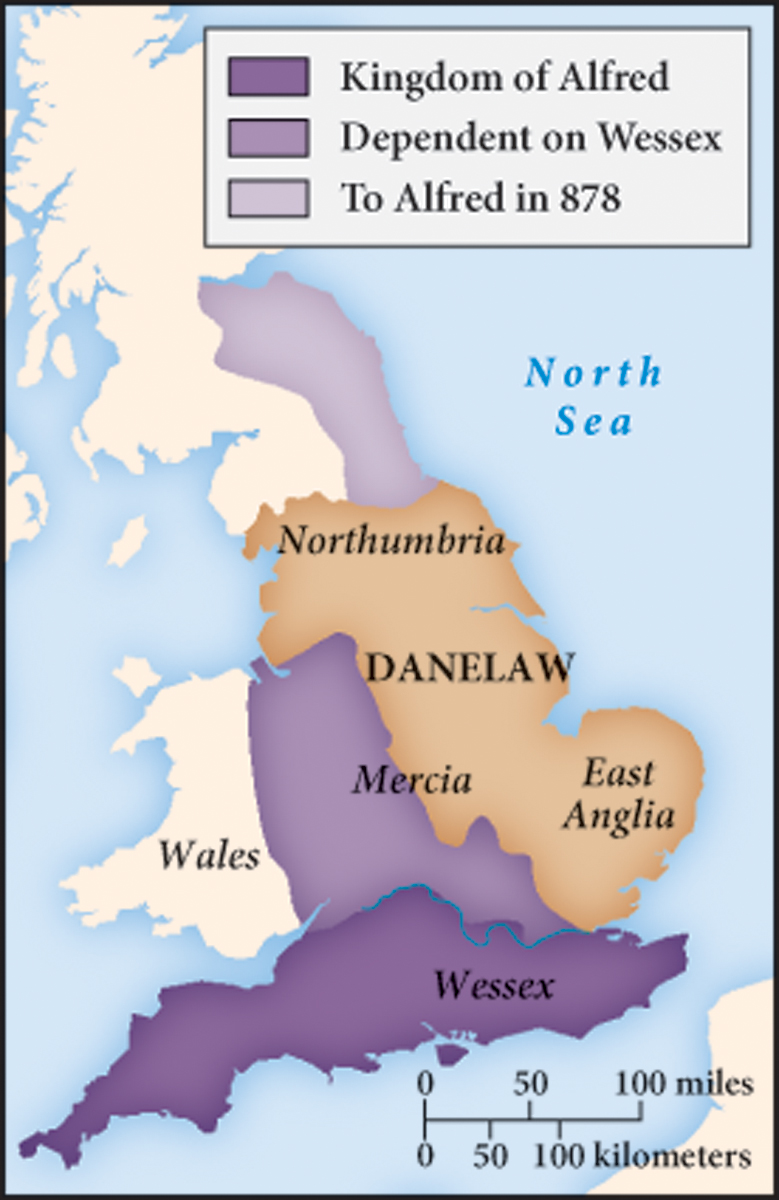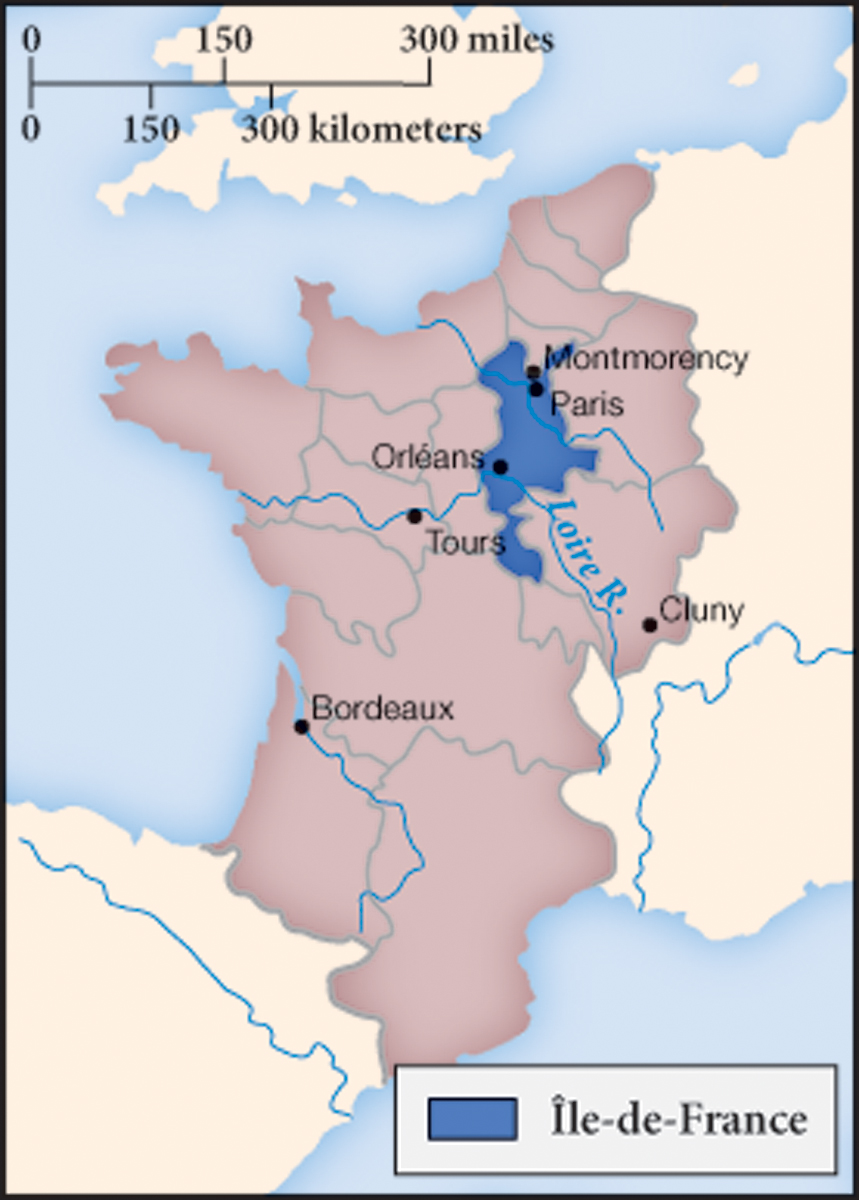Political Communities in Italy, England, and France
Political Communities in Italy, England, and France
The political systems that emerged following the breakup of the Carolingian Empire were as varied as the regions of Europe. In northern and central Italy, cities were the centers of power, still reflecting, if feebly, the political organization of ancient Rome. Italian lords tended to construct their family castles within the walls of cities. From there they the controlled the land and people in the surrounding countryside.
Italian cities also served as marketplaces where peasants sold their surplus goods, artisans and merchants lived, and foreign traders offered their wares. These members of the lower classes were supported by the wealthy elite, who depended, here more than elsewhere, on cash to satisfy their desires. In the course of the ninth and tenth centuries, the peasants in the countryside became renters who paid in currency, helping meet their landlords’ need for cash.
Families in Italy organized themselves quite differently from the patrilineal families of France. To prevent dividing its properties among heirs, the Italian family became a kind of economic corporation in which all male members shared the profits of the family’s inheritance and all women were excluded. In the coming centuries, this successful model would also serve as the foundation of most early Italian businesses and banks.

In contrast to Italy, most of England was rural. Having successfully repelled the Viking invaders, Alfred the Great, king of Wessex (r. 871–899), developed new mechanisms of royal government, instituting reforms that his successors continued. He fortified settlements throughout Wessex and divided the army into two parts, one with the duty of defending these fortifications, the other operating as a mobile unit. Alfred also started a navy. The money to pay for these military innovations came from assessments on peasants’ holdings.
Along with its regional fortifications, Alfred sought to strengthen his kingdom’s religious integrity. He began his program of religious reform by bringing scholars to his court to translate works by church fathers such as Gregory the Great and St. Augustine into Anglo-Saxon (Old English) so that everyone would understand them. Alfred himself did some of these translations. He had even the Psalms, until now sung only in Hebrew, Greek, and Latin, put into the vernacular—the common spoken language. In most of ninth- and tenth-century Europe, only the Latin language was used in writing. In England, however, the spoken language became a written language as well.
Alfred’s reforms strengthened not only defense, education, and religion but also royal power. He consolidated his control over Wessex and fought the Danish kings, who by the mid-870s had taken Northumbria, northeastern Mercia, and East Anglia. Eventually, as he successfully fought the Danes who were pushing south and westward, he was recognized as king of all the English not under Danish rule. He issued a law code for all of the English kingdoms, becoming, in effect, the first king of all the English.
Alfred’s successors rolled back the Danish rule in England even though many Vikings remained. Converted to Christianity, their great men joined Anglo-Saxons in attending the English king at court. As peace returned, new administrative subdivisions for judicial and tax purposes were established throughout England: shires (the English equivalent of counties) and hundreds (smaller units). The powerful men of the kingdom swore fealty to the king, promising to be enemies of his enemies, friends of his friends. England was united and organized to support a strong ruler.
Alfred’s grandson Edgar (r. 957–975) commanded all the possibilities early medieval kingship offered. He was the sworn lord of all the great men of the kingdom. He controlled appointments to the English church and sponsored monastic reform. In 973, he was anointed king. The fortifications of the kingdom were in his hands, as was the army, and he took responsibility for keeping the peace by proclaiming certain crimes—arson and theft—to be under his special jurisdiction and by mobilizing the machinery of the shire and the hundred to find and punish thieves.
Despite its apparent centralization, England was not a unified state in the modern sense, and the king’s control was often tenuous. Many royal officials were great landowners who (as on the European continent) worked for the king because it was in their best interest. When it was not, they allied with different claimants to the throne. This political fragility may have helped the Danish king Cnut conquer England. As king there from 1017 to 1035, Cnut reinforced the already strong connections between England and Scandinavia while keeping intact much of the administrative, ecclesiastical, and military apparatus already established in England by the Anglo-Saxons. By Cnut’s time, Scandinavian traditions had largely merged with those of the rest of Europe and the Vikings were no longer an alien culture.

Across the Channel, French kings had a harder time than the English coping with invasions because their realm was much larger. They had no chance to build their defenses slowly from one powerful base. During most of the tenth century, Carolingian kings alternated on the throne with kings from a family that would later be called the Capetian. As the Carolingian dynasty waned, the most powerful men of the kingdom—dukes, counts, and important bishops—came together to elect as king Hugh Capet (r. 987–996), a lord of great prestige yet relatively little power. His choice marked the end of Carolingian rule and the beginning of the Capetian dynasty, which would hand down the royal title from father to son until the fourteenth century.
In the eleventh century, territorial lordships limited the reach of the Capetian kings. The king’s scattered but substantial estates lay in the north of France, in the region around Paris—the Île-de-France (“island of France”). His castles and his vassals were there. Independent castellans, however, controlled areas nearby. In the sense that he was a neighbor of castellans and not much more powerful militarily than they, the king of the Franks—who would only later take the territorial title of king of France—was just another local leader. Yet the Capetian kings had considerable prestige. They were anointed with holy oil, and they represented the idea of unity inherited from Charlemagne. Most of the counts, at least in the north of France, became their vassals. But because they were powerful, these vassals’ obligations to the king were minimal.